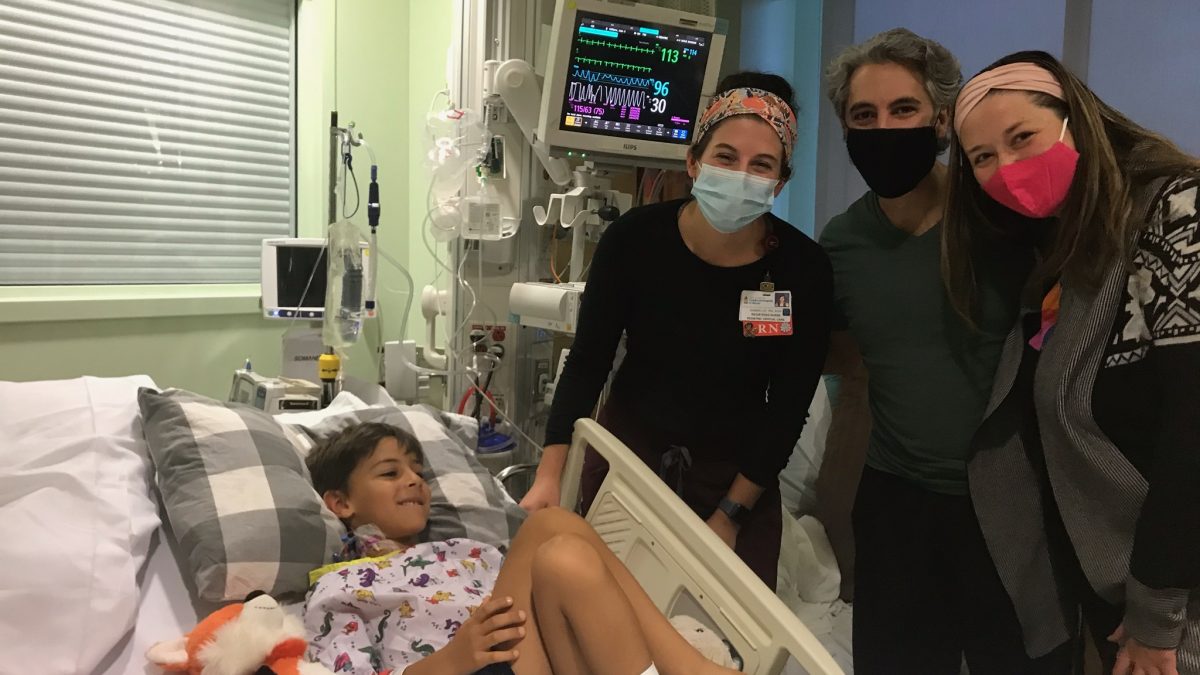The Magic of Stress Inoculation
The Magic of Stress Inoculation

- Anger
- Anxiety & Panic
- Beliefs
- Comfort Zone
- Conflict
- Courage
- Criticism
- Dangerous People
- Difficult People
- Family
- Fatherhood
- Fear
- Grandparents
- Gratitude
- Happiness
- Keys To Greatness
- Leadership
- Mentoring
- Motherhood
- Personal Crisis
- Personal Growth
- Personal Responsibility
- Politics
- Popular Culture
- Prayer
- Sacrifice
- Suffering
- Taking Action
- Teenagers
 Last week I wrote about my five-year-old grandson, Liam, who was scheduled to have open-heart surgery on Tuesday, October 13. At the end of my article, I asked for prayers for Liam. I’m happy to report that the surgery was successful. The surgeon was able to apply a patch that was a little larger than a dime to the hole in Liam’s heart, and after the surgery, Liam’s heart rhythm was normal, and he was placed in the intensive care unit.
Last week I wrote about my five-year-old grandson, Liam, who was scheduled to have open-heart surgery on Tuesday, October 13. At the end of my article, I asked for prayers for Liam. I’m happy to report that the surgery was successful. The surgeon was able to apply a patch that was a little larger than a dime to the hole in Liam’s heart, and after the surgery, Liam’s heart rhythm was normal, and he was placed in the intensive care unit.
The following morning (Wednesday), Liam’s parents helped him out of bed and took him for a walk. On Wednesday night, Liam and his parents had a surprise visitor — my younger brother Steve’s daughter, Danielle, who works as a registered nurse at Saint Francis Hospital.
By Divine Providence, she was working third shift and Liam was one of her patients. The picture that I posted above was taken during the night and shows Liam in bed. Standing next to his bed are his parents, Harry and Katheryn, and my cousin, Danielle Williams.
When I saw the picture, my initial thought was, Wow, God wanted us to know that he heard and answered our prayers by arranging for my cousin to help take care of Liam. I then thanked God for the large, extended family that he blessed us with. My brother Steve was my mom’s 12th child (out of 17 children), and it was his daughter who was at the hospital taking care of Liam.
In addition to having numerous cousins, nieces, and nephews who are always available to lend a helping hand, there are other significant ways in which me and my siblings benefited from growing up in a large family. One of those benefits was the psychological conditioning that we I received while we were growing up. The conditioning I’m referring to is used by the United States Department of Defense and is referred to as “stress inoculation.”
The word “inoculate” is defined as “the introduction of a vaccine into the body of a person to produce immunity to a specific disease.” After a person receives a vaccine, the person has been inoculated because the vaccine provides an immunity to the disease.
So what is stress inoculation? TheFreeDictionary.com describes “stress inoculation” as “an approach intended to provide patients with cognitive and attitudinal skills that they can use to cope with stress.”
In certain branches of the U.S. Military, in addition to basic training, various psychological training methods are used to condition soldiers, so they can perform calmly and rationally when they are under short-term acute stress.
The stress inoculation training that the soldiers receive helps them to develop the skills that are necessary to quickly adjust to surprise, shock, and unfamiliar surroundings. As they learn those skills, they develop increased confidence, resilience, and psychological stability.
Last week, I wrote that there are some people who are born with the ability to calmly, confidently, and rationally navigate their way through the stress of a serious crisis. While most people are not born with this ability, they can be trained to react to a serious crisis in a calm, confident, and rational manner.
A “serious crisis” includes potentially dangerous or negative life-changing events that occur on a personal level or within a family, business, or society. A medical emergency is a serious crisis. An economic collapse is a serious crisis. The pandemic that we’ve been going through is a serious crisis.
The environment that people grow up in has a lot to do with whether they will be trained to react in a calm, confident, and rational manner to a serious crisis.
As I mentioned earlier, one of the significant benefits of growing up in a large family was that it was not uncommon for me and my siblings to be forced to deal with short-term stressful situations, which ended up strengthening our ability to perform calmly while managing future stressful events.
My parents didn’t purposefully plan to put us through stress inoculation training. In fact, I’m sure they never heard of the term “stress inoculation.” They simply did what every decent parent of a large family is forced to do — they made their children sacrifice and take personal responsibility for their own actions, work out their own disputes, and follow the rules of the household, regardless of whether or not they agreed with the rules. My parents also had no other choice but to deny their children various perks and privileges that children in smaller families were accustomed to receiving.
Many of the young adults in our country today did not grow up in environments that trained them to sacrifice and respond appropriately to stressful situations. Since they did not learn the important skills that are required to manage stressful situations, when a crisis occurs, they react with fear, anger, negativity, and in some instances, violence.
There have been several psychological studies that have indicated that children who are sheltered from short term stressful situations do not ordinarily develop the ability to adequately cope with a serious crisis. One such study was published in the Journal of Developmental Neuroscience and showed that stressful experiences that are challenging but not overwhelming can provide children with the skills that are necessary to successfully handle stressful events as adults.
You may have heard the word “Snowflake” used to describe a young person who is so hypersensitive and irrational that when their beliefs are challenged, they react by shouting, interrupting, threatening, and/or assaulting the person who has offended them. In my opinion, the recent rioting that has taken place in our country has, in part, been fomented by Snowflakes who never learned how to cope with a serious crisis.
Any time that the opportunity arises, I do my best to encourage young married couples to be open to God’s plan for their family, which means that they should not limit the size of their family to the cultural norm that defines “the perfect family” as only consisting of a boy and a girl.
****
Thank you for your prayers for my grandson. In addition to benefiting greatly from the involvement of his parents and his extended family, he also benefited from his family of Christian brothers and sisters who were willing to pray for him.
Praise be to God for his goodness and mercy.




1 Comment
[…] Next week, I’ll let you know how everything worked out, and I’ll share some ideas on how you can train youself or your children how to respond to a serious crisis in a calm, confident, and rational manner. print […]